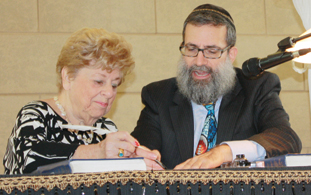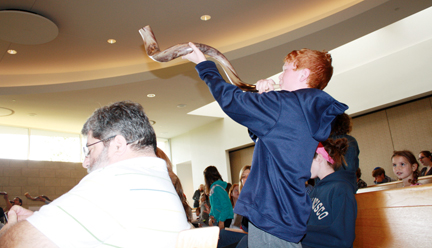
“I can imagine a community of people who know one another by name, who pray together, raise children with similar values together, celebrate life together.”
Rabbi Mark Levin spoke those words in his sermon as the rabbi of Congregation Beth Torah at its very first service, on July 22, 1988. As the congregation plans to celebrate its 25th anniversary with a series of events Nov. 1 through Nov. 4, those words continue to ring true in the congregation’s newest watchword, “We are the community we need.”
Rabbi Levin, who has served as the congregation’s only pulpit rabbi and who plans to retire from that position and assume a scaled back role as founding rabbi this coming summer, was one of the reasons the congregation was born. He was serving as a rabbi at The Temple, Congregation B’nai Jehudah and was in the midst of interviewing for jobs in other cities. According to the book “Voices: Recollections from the Early Days of Congregation Beth Torah” written by Cheryl Hall Harris and Eileen Garry in 1998, “Those who were involved in the creation of Beth Torah felt “an urgent sense that Kansas City could ill afford to lose a rabbi with the magnitude of skills and humanity that Mark Levin exemplifies.”
Less than four months after the group’s initial meeting on March 27, 1988, they had secured Rabbi Levin’s services and held its first erev Shabbat service as Congregation Beth Torah.
Hal Sader, Beth Torah’s first president, noted in the book that this group of people also foresaw the need for a congregation in Johnson County. The Jewish Community Campus was to open in that area that fall. At that time another Reform congregation, Temple Beth El, was also located at 83rd and Lamar.
Tom Cohen, another founding member of the congregation, reiterated last week that there was a casualness to the early services that encouraged him, and others, to become involved with it.
“We all sing and say the whole service. I remember (Rabbi Levin) always asking people to introduce themselves. These were early reasons we were attracted and remained involved,” Cohen said.
The congregation’s current president, Michelle Cole, joined the congregation about six years ago and said the communal aspect of the congregation, and its friendliness, is one of the things that attracted her family to it.
“Even though the people on staff and the clergy met my family only one time, they made it a point to come up to us all the time when they saw us. We felt very welcome,” Cole said.
Early milestones
One of the congregation’s earliest achievements was the success of its religious school. Sader noted in 1998 that “In almost no time, we went from being the smallest congregation to having the largest religious school in the city. That said a lot for us.”
His wife Carol Sader added, “We started immediately attracting young families with children. That is partly due to Jewish geography in Kansas City. The Jewish population was clearly moving out into Johnson County.”
Beth Torah’s building was opened in October 1996, three weeks after Yom Kippur and only eight years after its inception. This year the sanctuary, as it has been for many years, was filled to capacity during the High Holidays.
25 years later
 Rabbi Levin said he believes they have indeed been successful in creating the founders’ vision of a congregation dedicated to liberal Judaism in southern Johnson County.
Rabbi Levin said he believes they have indeed been successful in creating the founders’ vision of a congregation dedicated to liberal Judaism in southern Johnson County.
The rabbi is very proud of the social justice programming the congregation has conducted over the years.
“We have fed tens of thousands of people in 25 years. We have involved thousands of people in social justice projects. For almost 25 years, we’ve been underwriting the food budget at the reStart shelter for the month of January and providing hundreds of volunteers to serve meals on weekends. For upwards of 20 years Beth Torah members have served every Sunday night dinner at SAVEhome. Hundreds of volunteers have gone to deliver meals on Thanksgiving and Christmas to impoverished families. Hundreds of tons of food have been donated to food pantries all over the city,” he reported
Many believe that Beth Torah’s worship model, and its religious school model, have been copied by other Reform congregations across the country.
“We read the entire service together. At the time that we started that in 1988, I knew of no other congregation in the country that was reading the entire service together. Now it’s a widespread practice. What role did we have in that? Maybe it just occurred in a lot of places at the same time, I have no idea.
“The gathering on Sunday morning to bring families together to start the day together, to eat together, to pray together … I believe that’s been copied in other places as well,” he said.
Sader is not at all surprised the congregation has flourished and grown to 650 members over the years.
“The original concept was to have a limited size congregation that would really foster intimacy and closeness and a very sharp sense of community,” Sader said. “I’m not surprised at the size now considering the effort and the work that people have done. Of course the attractiveness around Rabbi Levin’s pulpit orations and pastoral work over the last 25 years has contributed to that as well.
“Our emphasis was making the congregation as potent a force in the community as we could and as a result of that, the longevity of the congregation certainly was within my expectations,” he continued. “We’re based upon the principals of Torah, avodah and works of loving kindness and that says it all.”
In addition to Rabbi Levin’s leadership, which Sader characterized as outstanding, he said the hard work of volunteers and staff over the years is what has brought the congregation to what it is today.
“We really have developed an outstanding cadre of leadership on our board and on our staff and I really don’t know of anyone who isn’t committed to the kind of congregation that we’ve become.”
Sader said the other thing that has contributed to Beth Torah’s success is its diversified congregation in terms of membership. It has always embraced interfaith families and others not always welcome elsewhere.
“We have a significant gay portion of our congregation who are welcome and treated like everybody else. That makes you feel very good that this is an open congregation as far as beliefs and as far as how we treat people. I think all of that came together to really foster our success,” Sader said.
The current president believes Beth Torah’s welcoming environment has been the key to the congregation’s success.
“We have that motto ‘we are the community we need,’ and it’s true. I think it starts and ends with the congregants and the staff. There is always somebody there to answer a question, you always meet new friends, the 15-minute Friday night initiative that happened a couple of years ago …. I think people aren’t so intimidated by going to temple, no matter when it is and no matter who you are,” Cole said.
The bridge to the future
Over the years Rabbi Levin believes Beth Torah has touched a lot of lives.
“I believe it’s had an influence in the Kansas City Jewish community and perhaps in the larger community as well. But having said that, the major focus has to be on what kind of a vision do we need for the next 25 years that will keep the local Jewish community a vital and creative place with Jews of every age involved in the same kind of creative fashion we’ve had for the last 25 years and before that. I think that’s a real challenge,” he said.
Many members are mindful that with Rabbi Levin’s retirement, change is coming soon.
“The congregation as a whole is going through a transition now but things will only continue to get better,” Cole said.
As it is with any congregation, the rabbi is the reason some people belong to a congregation. Cole said when Rabbi Levin retires and an interim rabbi, and subsequently a new pulpit rabbi is hired in 2015, membership may fluctuate for a while.
“But Rabbi Levin is not the congregation. We are. He started it, but people have to have faith in the organization as a whole, what we have done for the past 25 years and what we will continue to do to engage people in the next 25 years,” Cole said.
Rabbi Levin’s role with the congregation after he officially retires has not been defined just yet.
“I intend to be involved to the extent that I am asked. I am looking forward to new leadership that will bring a different kind of vision, a vision that is influenced by the digital revolution that we’ve been through, who can say here’s where the community needs to go to be creative and vital for the next 25 years. I hope to be a piece of that, I’m looking forward to who will take the reins and lead in the direction necessary to be as innovative as we’ve been for the last quarter century,” he said.
Rabbi Levin said the congregation’s Torah Writing project, which began earlier this month and will conclude in June, is the beginning of its next 25 years.
“We are very fortunate that we have in our ark a Torah scroll that we are told is between four and five centuries old. It probably came from Northern Italy. Think about a 450-year-old Torah scroll. All the communities that it has seen, all the Jews that have read from it, all that it meant to Judaism for the last 450 or 500 years. That is an appreciable percentage of Jewish history, about 16 percent. That’s amazing.
“And now here’s a scroll that’s going to be written. It’s going to start out in Overland Park, and it’s going to link Jews to all the generations of Jews past who have read the Torah but just like this scroll has a history, so our scroll will have a future to link Jews. Who knows how many communities over what period of time and how many Jews will read from it. We are creating our own Torah scroll with all the traditional teachings that will link our people to the generations yet to come, as well because it’s a traditional scroll, to the generations that have been. I find that extremely exciting. In a sense it’s a piece of immortality.”


